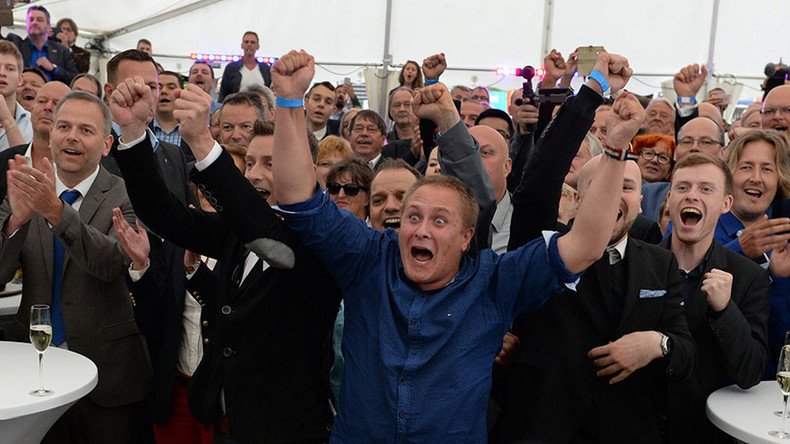Nazis need not apply: 'German anti-immigration party AfD does not endorse xenophobia'

Criticism of the AfD as a “Nazi party” has to end now, nobody can say that anymore without ridiculing himself, Peter Boehringer a deputy spokesman for AfD told RT. He added that the anti-immigration party is willing to work with other political groups.
Angela Merkel's CDU party got a wake-up call from german voters on Sunday in the chancellor's home state. While the ruling Social Democrats held on to the leading spot, Merkel's conservatives came in third behind AfD.
Merkel’s Christian Democratic Union (CDU) has attracted just 19 percent of the votes, compared to 23 percent in the 2011 elections. The ruling Socialist Democratic Party (SPD) garnered 30 percent, a 5 percent drop from four years ago.
AfD is now positioning itself for seats in the Bundestag next year.
RT: Germany's main parties have so far refused to work with the AfD, which makes a role in government unlikely. What can it realistically achieve in opposition?
Peter Boehringer: First of all, we had a very good result. Never before has a party in Germany gone from zero to 20 percent from nothing. We gained votes from all four former big parties, from all sides of the political spectrum. Merkel’s CDU even ended up behind us at 19 percent, and the Green party even dropped out completely. So the bashing of the AfD as a “Nazi party” or something like that really has to end now, nobody can say that anymore without ridiculing himself. We do not promote xenophobia or something. We have quite a few other topics to work with others. This was not a federal election, so it is not the question whether we will work with them. The majority is of course, not there. We have 21 percent, that’s great, but that is not yet a majority. But even more important I think is the general consensus of the old parties is still pro-euro, pro-EU and a few other stances in international politics especially toward Eastern Europe which are not acceptable.
READ MORE: ‘Political shift happening in Germany over Merkel’s open-door migrant policy’
RT: Your party has been called Islamophobic, xenophobic, and nationalist. How do you shake off labels like these? How likely is it that other parties will agree to work with you?
PB: Overtime it is necessary, but we will need to see a lot of switches in the mindsets of those old parties, especially on immigration and also in foreign policies and European politics. Everything is illegal here. We are the party which upholds the right and the law. So something has to change. We have to gain even more votes. Currently, it is not realistic both from our side and for the other parties to go into a coalition government. But this can change very quickly as we’ve seen yesterday from zero to 20 percent.
“What happened right now is that the CDU tried to be more right than the right parties. If you have a program that is against immigrants and that makes the people afraid… then the people will vote for the original. Why should they do a copy? It is unclear where the big parties really stand.” - Remzi Aru, political expert and founder of the Alliance of German Democrats (ADD) commented on the results of Sunday’s elections:
RT: What mindset do these old parties have to switch to come in line with you?
PB: First of all, we have to get back to orderly border management, we have to get the illegal immigration - some call it the invasion in Central Europe and Germany - we have to stop that ultimately. There is not a single parliamentary party in Berlin currently that is willing to stop it. So somebody has to take that up.
Where the AfD votes came from in Mecklenburg-Vorpommern, according to @infratestdimap: pic.twitter.com/TxQG00ysbt
— Alberto Nardelli (@AlbertoNardelli) September 5, 2016
RT: Isn’t the ‘invasion’ a big word for refugees who really possess nothing?
PB: Of course, they are refugees. But you have a lot of help, it would be impossible without the abolishment of important laws - like the Dublin law - which would have stopped the immigration from the very beginning. There are a lot of NGO organizations promoting this invasion.
The statements, views and opinions expressed in this column are solely those of the author and do not necessarily represent those of RT.













